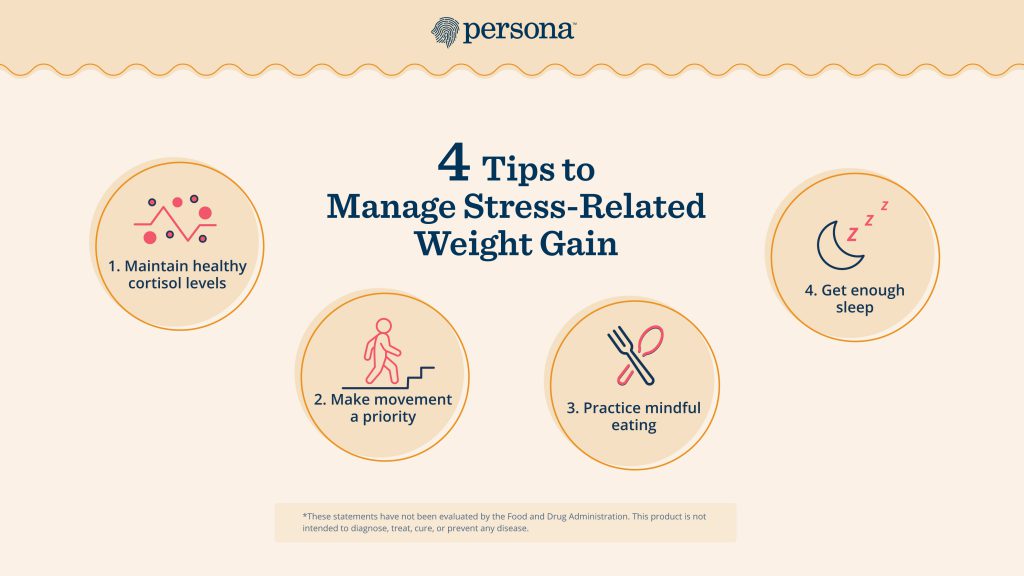Whether you’re slogging through long days at work, worried about making ends meet, or getting frustrated at stop-and-go traffic, stress is a feeling that we all know *too* well. And when we feel stress more often than not, most of us start to feel its unpleasant effects, like weight gain. There are a series of reasons why we gain a few extra pounds when we’re under pressure, but that doesn’t mean we need to go up a jean size whenever life feels a bit much (but hey- it happens!). There are small changes we can make to our day-to-day routine to help us stay in shape. Keep reading to learn how to minimize the effects of stress-related weight gain.
1. Maintain healthy cortisol levels
If you’re not familiar with cortisol, here’s the gist: it’s your body’s main stress hormone and it plays a major role in orchestrating your body’s main functions, like eating. When you’re stressed, cortisol tells your body that it’s time to fuel up. Ever notice that when your stress increases, so does your appetite for ultra-sugary processed foods like chips, cookies, or ice cream? No shame in the stress munchies! But while these foods give a short boost in energy, they wont fill you up and the energy is short-lived… a reason you keep going for more. What makes matters worse, cortisol triggers your body’s metabolism to slow down so energy can be used elsewhere (to fight whatever threat is ahead of you).1
Expert tip: To help reduce cravings and snacking, eat enough protein and healthy fats to keep you fuller longer. Adding adaptogens like ashwagandha, CBD or fermented ginseng to your daily routine can also lend a hand to help keep your cortisol in check.
2. Make movement a priority
It’s no secret that regular exercise helps prevent unwanted weight gain. Not only does it help manage cortisol levels, promote better sleep and boost your basal metabolic rate2 (the number of calories you burn at rest), but it also helps your body to be more resilient to everyday stressors according to one study.3 What does that mean? When you’re lifting weights at the gym or jogging outside, these workouts imitate the effects of stress, like your fight-or-flight response and helps your body to practice coping through it to minimize its negative effects.
If lifting weights or running isn’t your thing – don’t worry! You don’t have to do an intense workout to reap the benefits. Simple activities that you’ll stick to for a while are best. Not sure where to start? Try taking a walk during your lunch break, following a yoga video at home, or joining a fitness class – these are all great ways to get started.

3. Practice mindful eating
Ever sit down to eat while watching your favorite show or scrolling through IG reels, only to realize you’ve finished your meal without noticing? Decompressing with some screen time during your meal isn’t necessarily a bad habit, but if you can’t remember if you actually chewed your food or inhaled it – or even what you ate, it’s a sign you may be out of tune with your hunger and fullness cues. This can lead to overeating and weight gain.
Instead of zoning out to your phone or the TV, try mindful eating. Eating mindfully means limiting distractions, paying attention to your surroundings and giving your full attention to the food on your plate. Not only can mindful eating aid with portion control and improved eating patterns to help manage weight4, but it also allows you to fully enjoy your meal and every bite…because it’s probably quite delicious!
4. Get enough sleep
Whether you’re staying up late trying to meet a deadline or the list of tasks you have waiting in the morning is keeping you up – not getting enough snooze time can add to weight gain. Lack of sleep can elevate cortisol, which can lead to increased appetite. What’s more, skimping out on those zZz’s also causes an imbalance in your appetite hormones ghrelin (signals your body’s hunger cues) and leptin (tells your body its full). When these appetite-regulating hormones are thrown off, it’s easy to overeat since it may be harder to recognize when you’ve had enough. 5
Expert tip: For a better night’s rest, try keeping your bedroom a bit cooler than usual and unplug from electronics at least an hour before bed.
What supplements can help with stress and weight gain? Read 5 supplements to help manage stress-related weight gain
About Natalie
Natalie is a nutritionist with a Bachelor’s in Nutrition and Dietetics from the University of North Florida. Natalie believes that proper nutrition doesn’t have to be complicated and is determined to help others reach their health goals.
Do you have questions about supplements? Reach out to one of our experts, or take Persona’s free nutrition assessment, and learn exactly what you need to take your wellness to the next level.
*These statements have not been evaluated by the Food and Drug Administration. This product is not intended to diagnose, treat, cure, or prevent any disease.
This information is not intended as a substitute for the advice provided by your physician or other healthcare professional, or any information contained on or in any product label or packaging. Do not use the information from this article for diagnosing or treating a health problem or disease, or prescribing medication or other treatment. Always speak with your physician or other healthcare professional before taking any medication or nutritional, herbal, or homeopathic supplement, or using any treatment for a health problem. If you have or suspect that you have a medical problem, contact your health care provider promptly. Do not disregard professional medical advice or delay in seeking professional advice because of something you have read in this article.

